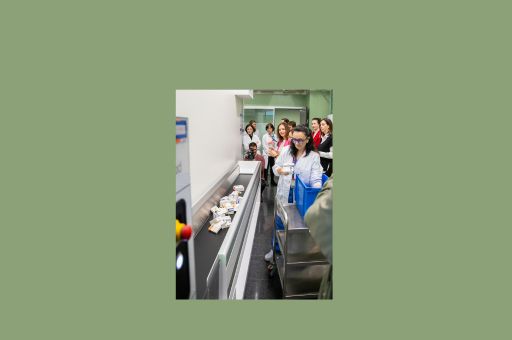The Regional Minister of Health, Manuela García, visits the advances of the Service in the optimisation of resources
This system automatically controls the batches and expiry dates of the medication, as well as its storage and registration, The Regional Minister of Health, Manuela García, visited the Hospital Pharmacy Service of the Son Espases University Hospital to see the modernisation and optimisation of its processes with the recent implementation of the automated medication dispensing robot ROWA, from the company BD. It is a system that stores and distributes medication efficiently because it recognises each container individually using a data matrix code that includes product, batch and expiry date information. This makes it possible to optimise the flow of storage and dispensing, efficiently monitor medicines, improve patient safety and avoid losses due to lost or expired medicines.
The councillor stressed that with ‘the new ROWA automated medication dispensing robot that we have acquired for the Son Espases Pharmacy, the hospital is at the forefront of pharmaceutical automation, guaranteeing a more efficient, safer and more patient-centred service’.
TDB keeps you informed. Follow us on: Facebook, Twitter and Instagram
The Pharmacy Service of Son Espases introduces a robot for dispensing medication for outpatients to speed up the work and improve safety
The improvement has materialised in the Outpatients Unit (UPE) of the Son Espases Pharmacy Service. This Unit is a specialised area that provides pharmaceutical care to people who, without being admitted to the hospital, need medicines for hospital dispensing or use. Hospital pharmacists and specialised technical nursing staff work in the SPU, caring for patients with chronic, autoimmune, infectious or oncological diseases, among others. These treatments require close and personalised monitoring. The Unit aims to guarantee safe and efficient access to treatments, improve adherence to them and contribute to better health outcomes.
This innovation, which has involved a major investment in healthcare technology (498,000 euros), improves efficiency in the dispensing of medicines, optimises stock management and reinforces safety in the pharmacotherapeutic process. The implementation of the ROWA robot also represents a substantial improvement over the previous system, which had become obsolete. With the acquisition, the hospital now has two robots: one for medicines at room temperature and one for thermolabile medication, located directly inside a refrigerated chamber to ensure proper preservation.
Two hundred patients a day
The unit currently serves around 200 patients a day and accounts for almost 40 % of the hospital’s drug expenditure. The new automated system streamlines the service, reduces waiting times, minimises potential dispensing errors and improves stock control and expiry dates. Its integration with electronic prescriptions has already demonstrated immediate benefits by providing fast and secure access to prescribed medication. In the next phases of development, it is planned to link it with the hospital’s SAP management system, which will allow automated order management.
The Hospital Pharmacy team stresses that this new system will improve the organisation of work, optimise the time of the professionals and achieve greater safety in the dispensing of medicines and that, with this technology, the Hospital is at the forefront of pharmaceutical automation, guaranteeing a more efficient, safer and more patient-centred service. “We would like to express our sincere thanks to all the professionals who have worked to make the implementation of this system possible, both from the Pharmacy Service and the IT Service, who have been able to adapt to the needs of the project and have carried out the tasks in a very tight timeframe. Their effort and commitment have been key to the success of this initiative,” said Clara Martorell, the Service’s coordinator.
